A brutal loss, a hot summer day––and the man with a cane who changed everything for Allison Marino.
As told to Julie Fingersh
When Reggie and I walk down the streets of New York City together, I usually notice a few double takes.
I’m a white girl in her 20s, with frizzy hair and corporate clothes, and he’s a lanky, black man in his 60s, with a backward baseball cap and a tattered backpack containing all his life’s documents. He’s also my friend, which is one-hundred percent my father’s doing.
You have to understand something about my father. Cas Marino was over-the-top, a huge presence. We were best friends. We spoke every day. He was brilliant, one point shy of genius on the IQ scale.
He ran drag bingo and starred in shows for the LGBTQ community all over Manhattan; his stage name was Shay Monieu. I didn’t have many friends who got their nails done with their dads. (No-polish buff on his fingers, nude on his toes.)
My father was proof of something: You can be so different from everyone around you and still be happy. To a kid who was bigger and louder than everyone at school (all those skinny, blonde girls), that was everything.
Right before I graduated from college, he was diagnosed with Hodgkins Lymphoma. Not long after, I left my new job in DC and moved back to New York to be his care taker. For seven months, I put absolutely everything I had into trying to keep him comfortable and alive.
This was a man who used get up on stage in a wig and boobs and a dress and make people laugh for hours, and now he was wasting away. In the mornings, when I had to leave him for work, I would put on his favorite show, The Golden Girls, and just walk out the door and cry.
My heart was so busy keeping me going to take care of this person I loved so much, but it was breaking. And then, despite everything we did, every treatment we tried, he died.
I got into bed and I couldn’t get out for three weeks. It felt like I had weights in my shoes. I was so angry. I had done everything right, and it still didn’t work. Now the person who showed me a future where I liked myself and the world was gone.
One scorching summer morning, I returned to work after my bereavement leave. I was in a rage, overwhelmed by my grief in a world that had stopped making sense. As I approached my office, I saw a homeless man by the door.
In this city, it’s easy to become desensitized to the people you pass, no matter how dire their straits. But the man was leaning on his cane, kind of jauntily—exactly the way my father had stood, as if he were in Singing in the Rain, about to click his heels. I just stared. It was like being hit by a brick.
I could feel my father speaking, Allison, I know you’re furious with the world, but here’s a chance for you to take your frustration and anger and energy and channel it. There’s still work for you to do.”
“Please, can somebody please help me?” The man said in a soft voice.
He wore faded jeans and beat up boots, a plain white T-shirt and a black baseball cap. He was desperate––and yet he emanated my dad’s same joyful spirit. And that, with the sincere need in his eyes and voice, got me.
“I don’t have cash,” I said, “But I’ll go to the deli and get you anything you want.”
He looked at me. “I’d love a chicken sandwich,” he said.
“And maybe a soda?” I asked.
“Sunkist is my favorite,” he said, with a smile in his eyes.
I knew I couldn’t fix his problems, but I thought, Let me do the best that I can for him. When I came back and handed him a hero, chips, a soda and some fruit and nuts, he looked first at the bag, then at me.
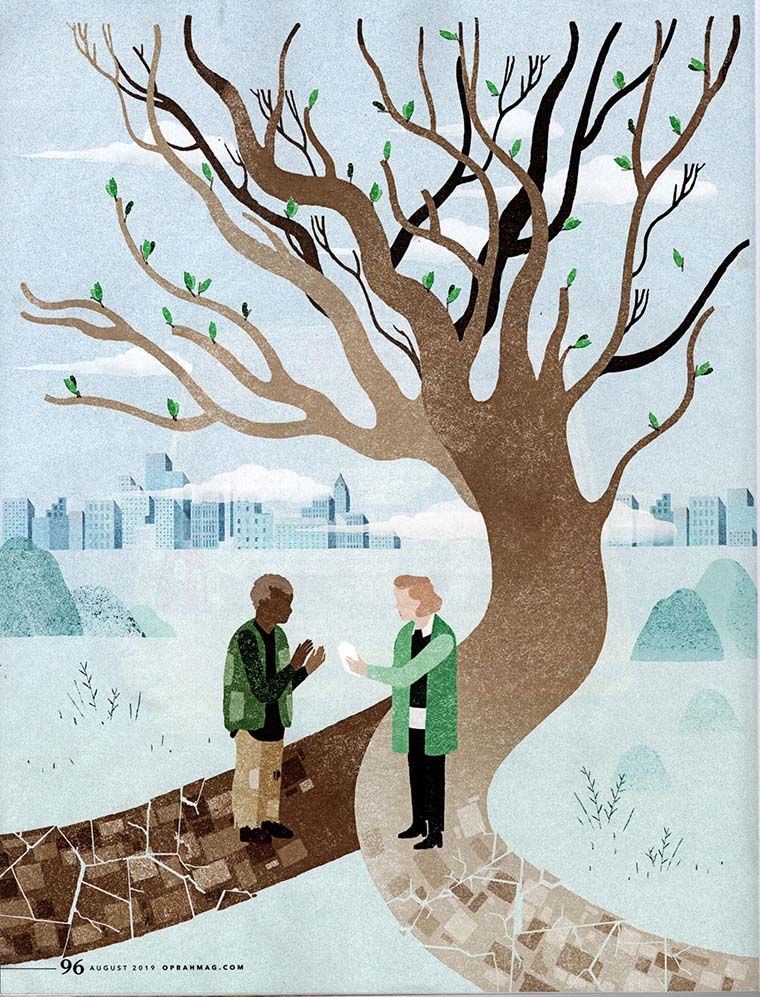
He took it from me gingerly, like I was handing him a Tiffany box. We introduced ourselves. His name was Reggie. After that, I’d bring him food every day. I had very little money, so I’d make a pot of pasta, put it in two containers, bring two forks.
We’d sit on a bench and eat, talking about the city and how it has changed since Reggie’s childhood, about the Coca-Cola route he used to run as a kid, about my work in nonprofits, about how unfair and beautiful life can be. I told him how I believed my dad had sent him to me. He loved to hear about Dad––he’d collect details about him, his head tilted.
But I don’t want it to sound all fairytale, because being friends with Reggie can also be painful. The world feels so heavy when someone close to you is suffering on a daily basis. He’d been homeless only a few months, having lost his job after an injury, then his housing in a fire.
And I felt so guilty, leaving him on the street to go home to my safe little apartment. So often he was my last thought at night and my first thought in the morning, because how could I not wonder where he was, if he was okay, where he would get his next meal?
Reggie didn’t show me his terror and shame often, but when he did, he’d cry, say how hard it was to be alone. One day he showed up with a black eye. He’d gotten into a fight with a man who stried to steal his shoes at the shelter. I felt so helpless.
“I told you I hate those shelters,” he said. That’s when you wish you had all the money in the world.
But no matter how many dead ends Reggie hit, he never stopped trying. It was always, Who can we go to? Who can we call? Who can we see about this?
At lunch, we’d work on his resume, navigate New York’s housing system. I’d vent to him about work and he’d commiserate. “That’s screwed up, Girl. You tell them what’s what. Go show them you’re boss!”
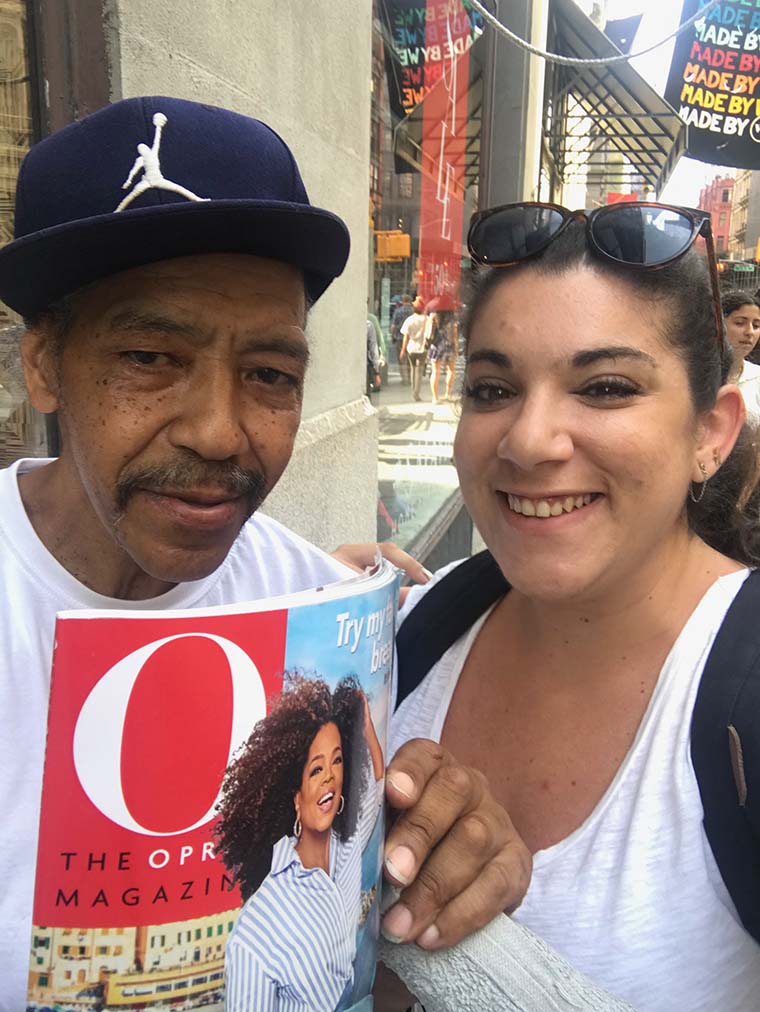
We’ve been friends for five years now. Reggie is living in stable housing, I got my masters in social work in human service leadership. And that’s because of him.
After my father’s death, I could easily have gotten stuck feeling like there was no point in putting myself fully into things when the outcome was so uncertain. Watching how Reggie approached his very daunting, very scary, very real problems made me want to come up with solutions for myself. He made me feel like I could handle any challenge in my path. He taught me that every bad thing you go through can be part of what makes you better. And he made me feel like it was okay to try again and to be myself in the world.
I’ll never stop missing my father. I still can’t bring myself to delete his phone number from my favorites list. But I know he’s always with me. Actually, he’s with me and Reggie, showing the world that all options, all boxes, are open to us if you just allow yourself to see them.
This story appeared in the August 2019 issue of O, The Oprah Magazine


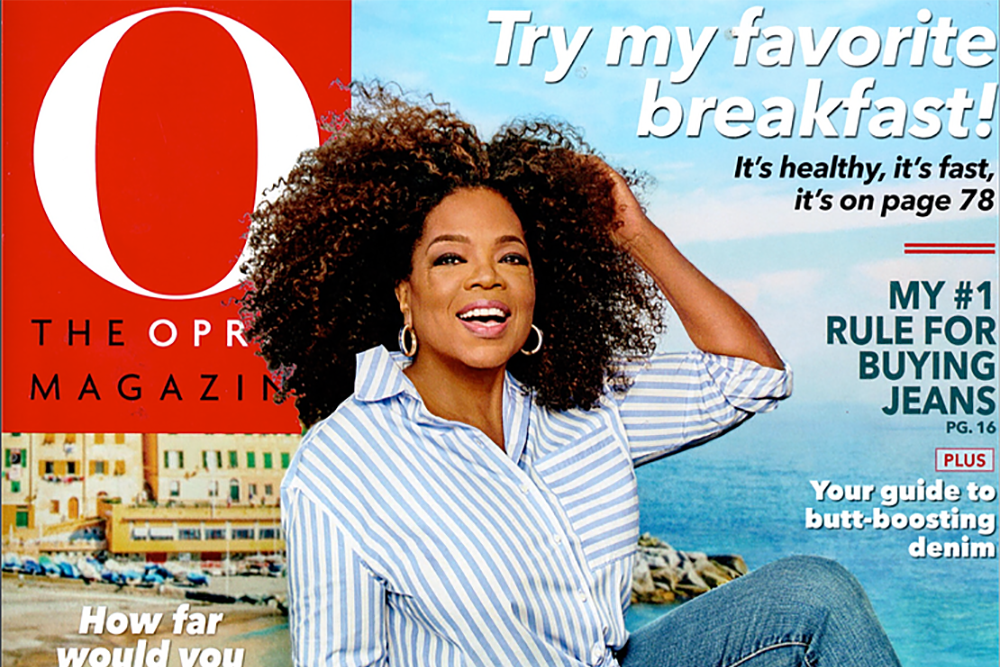
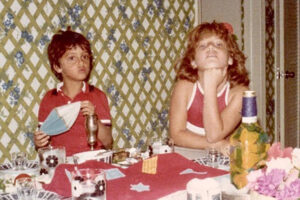
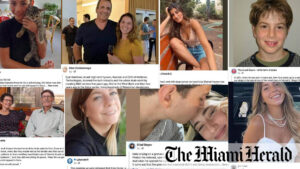

3 thoughts on “How Far Would You Go For Someone You Don’t Know?”
I read this heartfelt story in the O Mag in August. It really stuck with me. Thank you for sharing your story Allison and Reggie! Blessings, Gina ❤️
I feel so privileged to have known Cas, and this is a beautiful tribute to him. Thank you, Allison. ❤️ Cas and I went to Stuyvesant High School together, overlapping by just one year, and the funny thing is, because we were both heavily involved in Theatre, we had numerous mutual friends, but during that year, we never formally met. I would hear about his college days through our friends, but it wasn’t until 25 years later that we would finally meet, at an alumni mixer that just happened to be the night I “came out” to our fellow alumni, and Cas was there for me. We laughed at how funny it was that we each already knew so much about the other, by second-hand stories of mutual friends. My gratitude for his presence that night will always shine in my heart. It was heartbreaking to lose him so soon after finally connecting with him, but his memory lives on in the lives of the many, many people he touched. For us, his friends, he is an icon.
This is absolutely beautiful!!!!